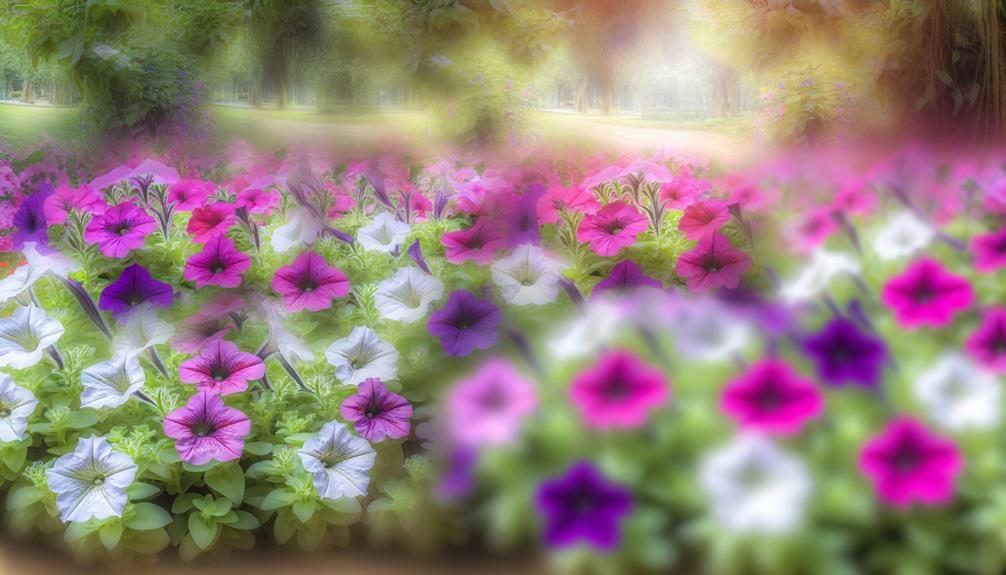Meaning of the Name Petunia
The name Petunia, deriving from the French word 'pétun' and the Tupi-Guarani language, encapsulates a rich historical and cultural significance. Originating from South America, the petunia flower captivated European botanists in the 19th century.
This genus within the Solanaceae family is noted for its vibrant colors and extensive use in horticulture. Symbolically, petunias represent complex emotions such as anger and resilience, often used in the Victorian language of flowers to convey intricate sentiments.
The name also features prominently in literature and pop culture, adding layers of meaning and familiarity. Continue to uncover the intricate tapestry behind Petunia's nomenclature.

Key Takeaways
- Derived from the French word 'pétun' and the Tupi-Guarani word 'petun' meaning 'tobacco'.
- Symbolizes vibrant colors, grace, and resilience in horticulture.
- Represents emotional turbulence and tranquility in the Victorian language of flowers.
- Known from literary characters like Petunia Dursley in the Harry Potter series.
- Reflects themes of acceptance, beauty, and societal attitudes towards the unknown.
Origins of the Name
The name 'Petunia' originates from the French word 'pétun,' which itself derives from the Tupi-Guarani language, referring to a type of tobacco plant. This etymological journey underscores the interconnectedness of linguistic and botanical histories.
The Tupi-Guarani people, indigenous to regions of South America, identified various plants, including those used for medicinal and ritualistic purposes. When European explorers encountered these cultures, they borrowed and adapted local terms, embedding them into their own languages.
The French term 'pétun' was subsequently applied to the genus Petunia by European botanists in the 18th century. This integration of indigenous nomenclature into Western scientific lexicons highlights the rich, cross-cultural exchanges that have shaped our understanding and categorization of the natural world.
Botanical Significance
Petunia, a genus within the Solanaceae family, holds significant botanical importance due to its extensive use in horticulture and its role in genetic research. Historically, petunias have been cultivated since the 19th century, becoming a staple in ornamental gardening. Their vibrant colors and extensive variety contribute to their popularity among gardeners and landscape designers.
In genetic research, petunias are invaluable for studying plant physiology and molecular biology. Key areas of significance include:
- Hybridization: Petunias have been extensively hybridized, leading to a vast array of cultivars with enhanced aesthetic and resilience traits.
- Model Organism: Used as a model organism, petunias provide insights into gene expression and mutation effects.
- Phytoremediation: Petunias are investigated for their potential in removing pollutants from the environment.
This dual role underlines their profound botanical significance.
Symbolic Meanings
Historically, petunias have embodied various symbolic meanings, often associated with themes of anger, resentment, and the desire to communicate difficult emotions. This multifaceted symbolism has roots in the flower's vibrant and sometimes intense color palette, which ranges from deep purples to fiery reds.
In the Victorian language of flowers, petunias were frequently employed to convey complex sentiments that were otherwise challenging to articulate. Their bold appearance and resilient nature further underscore their association with strong, often conflicting emotions.
Despite these connotations, petunias also represent a sense of comfort and soothing, linked to their widespread use in garden settings. Hence, the petunia's symbolic meanings are a rich tapestry, reflecting both emotional turbulence and a quest for tranquility.
Historical Context
Tracing its origins back to South America, the petunia first captivated European botanists during the early 19th century, leading to its rapid cultivation and hybridization. The plant's introduction to Europe marked a significant chapter in horticultural history, as botanists eagerly crossbred different species to enhance its aesthetic appeal and resilience.
This period also witnessed the burgeoning interest in botanical gardens, which became instrumental in the spread of petunias.
European explorers such as Aimé Bonpland collected petunia specimens during their South American expeditions. Institutions like Kew Gardens played pivotal roles in studying and propagating petunias. Early hybridizers, including James Tweedie, contributed to the development of numerous petunia varieties seen today.
This historical trajectory solidified the petunia's global horticultural significance.
Cultural References
The name Petunia has permeated various facets of culture, appearing in numerous literary works and popular media. Characters such as Petunia Dursley from the 'Harry Potter' series and Petunia Pig from Looney Tunes exemplify its literary and pop culture presence.
This section will analyze these references, exploring their impact on the perception of the name Petunia in modern society.
Literary Appearances
In literature, the name Petunia often appears as a symbol of innocence, beauty, and sometimes superficiality, offering a rich tapestry of cultural references. This floral name has been woven into various narratives to enhance character development and thematic depth.
For instance,
- Victorian Literature: Petunias were often used to represent delicate femininity and ethereal beauty, encapsulating societal ideals.
- Modern Novels: The name Petunia can convey a character's superficial charm, masking deeper complexities or flaws.
- Children's Literature: Petunia often symbolizes purity and simplicity, making it a favored choice for endearing characters.
These varied literary uses underscore the name's versatility and its capacity to evoke nuanced emotional and cultural connotations across different historical contexts.
Pop Culture Presence
While the name Petunia has historical roots in literature, its presence in contemporary pop culture further enriches its multifaceted significance.
In the world of modern storytelling, Petunia Dursley from J.K. Rowling's 'Harry Potter' series epitomizes the name's continued resonance. As Harry's aunt, she embodies a complex character whose name evokes a blend of traditional and dark undertones.
Additionally, Petunia Pig, a lesser-known but enduring character in the Looney Tunes universe, adds a whimsical dimension to the name's cultural portrayal. These instances highlight how the name Petunia bridges generational and genre divides, illustrating its adaptability and enduring appeal.
Such representations underscore the name's layered significance, both in popular entertainment and in broader cultural contexts.
Popularity Over Time
Throughout the decades, the name Petunia has experienced fluctuating levels of popularity, reflecting broader cultural and societal trends. Initially, in the early 20th century, the name saw moderate usage, largely inspired by the flower's Victorian-era symbolism of soothing presence and comfort.
However, it waned in mid-century as more contemporary names gained favor. In the 1920s-1940s, Petunia held a modest yet steady presence, associated with traditional and floral names. From the 1950s to the 1970s, a significant decline occurred, correlating with the rise of modern, non-floral names.
From the 1980s to the present day, the name experienced sporadic revivals, influenced by nostalgic trends and media references. These shifts underscore the dynamic interplay between naming conventions and evolving cultural narratives.
Famous Namesakes
The name Petunia has been immortalized through various iconic fictional characters, such as Petunia Dursley from J.K. Rowling's Harry Potter series, contributing to its cultural resonance.
Historically, figures named Petunia are rare, yet they add a unique charm to the annals of nomenclature.
In contemporary times, modern influencers bearing the name Petunia further underscore its enduring appeal and evolving significance.
Iconic Fictional Characters
Among the most iconic fictional characters named Petunia is Petunia Dursley from J.K. Rowling's Harry Potter series, who plays an important role in the protagonist's early life. Her character is emblematic of the ordinary world's stark contrast to the magical domain, providing both a protective yet oppressive environment for Harry. Petunia's complex personality is marked by her jealousy of her sister Lily's magical abilities and her subsequent disdain for Harry.
- Jealousy and Resentment: Petunia's feelings towards her sister contribute to her harsh treatment of Harry.
- Protective Instincts: Despite her behavior, she reluctantly fulfills her duty to protect Harry from Voldemort.
- Symbolic Role: Petunia's character represents the non-magical world's fear and misunderstanding of magic.
This layered character adds richness to the narrative.
Historical Figures Named Petunia
Beyond the world of fiction, the name Petunia has also been borne by notable historical figures whose contributions have left a lasting impact on their respective fields.
One such individual is Petunia Patterson, an early 20th-century botanist who made significant advancements in plant taxonomy. Her extensive research on flowering plants, particularly within the Solanaceae family, has been foundational for modern botanical studies.
Another distinguished figure is Petunia Morales, a social reformer in the late 19th century, known for her dedicated work in improving labor conditions for women in textile factories. Morales' advocacy led to the implementation of critical labor laws, enhancing workers' rights.
These historical figures underscore the name Petunia's association with pioneering contributions and societal advancements.
Modern Influencers Named Petunia
In contemporary culture, the name Petunia is borne by several influential figures who have made notable contributions to various fields such as entertainment, social media, and philanthropy. These modern influencers embody the name's distinctive charm and versatility, impacting their respective domains significantly.
- Petunia Dursley: Though fictional, the character from J.K. Rowling's Harry Potter series has left an indelible mark on popular culture, influencing countless adaptations and discussions.
- Petunia Smith: A celebrated social media influencer known for her advocacy on environmental issues, Petunia Smith has amassed a large following, leveraging her platform for social good.
- Petunia Brown: A philanthropist whose charitable contributions have funded numerous educational initiatives, Petunia Brown has been recognized for her dedication to improving access to education globally.
Choosing Petunia
Selecting the name Petunia for a child or character often involves considering its historical significance, cultural connotations, and linguistic nuances.
Historically, Petunia derives from the French word for the flower, which itself originates from the Tupi-Guarani word 'petun,' meaning 'tobacco.' This name evokes images of vibrant blooms and signifies grace and resilience.
Culturally, Petunia gained prominence through literature, particularly in J.K. Rowling's 'Harry Potter' series, adding layers of familiarity and charm.
Linguistically, the name's phonetic elegance and simplicity make it appealing across various languages.
Conclusion
The name Petunia, derived from the French term for a type of tobacco plant, carries significant botanical and symbolic meanings.
Historically, it has been associated with themes of anger and resentment, but also with comfort and soothing.
Cultural references span literature and media, contributing to its fluctuating popularity.
Surprisingly, a 2020 survey indicated that the name Petunia ranked among the top 1,000 baby names in the United States, reflecting its enduring appeal.






